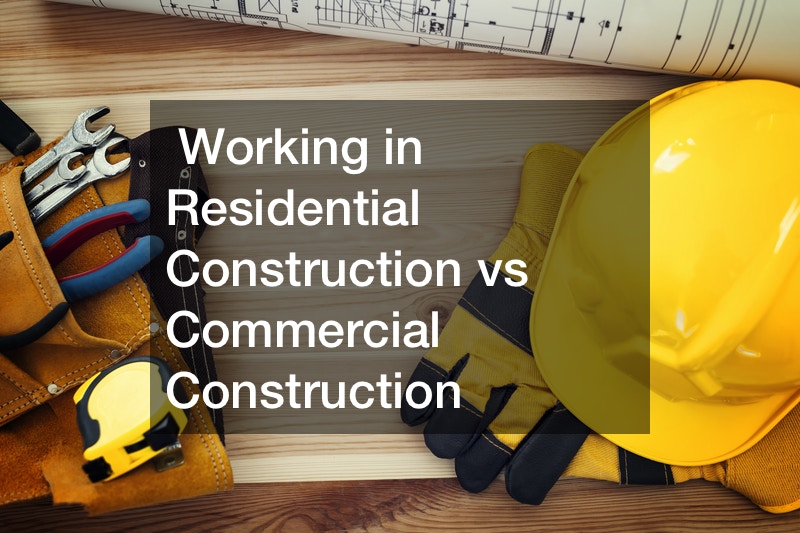
You want to get into construction work, but maybe you’re unsure of which route to choose in the great debate between residential construction vs commercial construction. Perhaps you’ve worked predominately or solely in one type of construction, or perhaps a little of both, or maybe even neither. No experience in either? How can that be?
Well, it’s not hard to be a skilled landscaper or carpenter or even handyman and find yourself with an opportunity to get into construction. The question remains: which one? Residential construction vs commercial construction. What’s the big difference? Usually, the big difference is the scope of work, permits, codes, zoning, etc. They each have their fair share of headache-inducing obstacles.
What it really comes down to is the type of construction you prefer overall. Call it a matter of personal taste. To make that choice, you should be aware of some of the similarities they share while also knowing what sets the two apart from each other.
Jobs for Commercial Companies

What exactly is commercial construction, and what kind of jobs out there require it? First, it should be known that commercial construction projects involve all work related to the building or remodeling of structures used for business. In other words, these buildings are built for people and machinery to work in.
These buildings can range from office buildings to manufacturing buildings to warehouses. If it is a place of business that relies on the employment of personnel and the housing of equipment or supplies for commercial use, it’s considered a commercial business. And for it to fall into this category, it also has to be zoned commercial, which usually means higher property taxes, insurance, and not occupying the same space as a residential property. Note that this doesn’t necessarily apply to farms, which are zoned for agricultural use. Technically, you can still live where you work.
Along with commercial buildings come commercial jobs. They don’t have to be the specific company occupying that space. These jobs could be commercial jobs that support commercial construction. In other words, jobs that make the construction of such property possible.
These jobs include work like commercial electrical service, commercial refrigeration installation and repairs, commercial freezer repairs, industrial kitchen service, industrial laundry service, industrial framing, roofing, foundations, and so on.
Everything commercial construction-related tends to be pricier, requires more insurance, more maintenance, while also being more industrial. Heavy-duty materials with higher energy requirements and enough space to support the necessary work are all needed.
There are also more safety features that need to be installed and maintained on-site. These range from things like hand sanitizer stations to eyewash stations. Personal protective equipment requirements. first aid stations, medical emergency equipment, installed sprinklers, and other fire fighting equipment. Commercial construction not only has jobs for the construction itself but all the other facets that go into making a successful commercial building operational on a daily basis.
Jobs for Residential Companies
Okay, so we’ve talked about commercial jobs in the residential construction vs commercial construction debate. Now let’s cover residential job opportunities.
Whereas commercial construction jobs support the building and repair of commercial buildings and all associated features of them, residential jobs, you guessed it, support the building and repair of residential buildings and all associated features of them.
Residential buildings can include single-family homes, townhouses, duplexes, apartments, and condominiums. They’re primarily used for living spaces (although you can have a home-based business these are usually small and have rules all of their own).
Like commercial buildings, the jobs that go into residential construction are similar in that they have specific zoning and code requirements. These rules usually aren’t as intense as their commercial counterparts.
Residential construction jobs can include residential roofing, residential plumbing, residential electrical service, residential landscaping (including brick paver or stamped concrete work), and fencing.
One thing you may encounter with residential work you won’t necessarily deal with in the commercial workspace is dealing with Homeowner’s Associations. You may have all the permits required for work and be up to code, but there are also the rules of the HOA that also need to be adhered to. This usually affects any work related to the exterior of the building, whether it’s roofing, landscaping, and/or fencing.
Sourcing Materials

Residential construction vs commercial construction. We’ve covered quite a few differences along with some similarities. One thing both absolutely have in common is sourcing materials like foundation service and repair. You need to identify good sources and maintain productive relationships with them.
This includes manufacturing companies, haulers, shipping companies, lumber yards, tool companies, you name it. If it’s just weekend warrior or handyman’s work, you can probably get what you need by going to your local hardware store or ordering material or equipment online, or renting tools if the work is for just a couple of days on a single job.
However, if construction is your line of work, the scope of that work will probably require you to make relationships with a good lumber yard, a place that specializes in drywall, a metal manufacturer, a concrete company, a tool distributor, and so on.
You should find sources that have good reputations, are well-reviewed and don’t have pending lawsuits against them. They should be able to provide you with testimonials and references, even provide you with locations of previous work they’ve supported. They should not just be reliable but demonstratively responsible.
Residential Gardening Service
Now let’s take a look at one thing that sets residential construction work apart from commercial work in the residential construction vs commercial construction debate. What might that be? Gardening services are a good example.
Now you would be correct to say that commercial buildings and facilities often require gardening services, too. However, in most cases, this is basic landscape maintenance (mowing and weeding) and beautification around certain areas (entrances and parking lots).
The type of building (malls, grocery stores, and buildings housing multiple businesses) also plays a big part in how much gardening service is desired. However, you’re not going to see a ton of trees around manufacturing plants or shipyards, or industrial warehouses. For them, it’s more about being clean and safe instead of pretty.
Residential buildings, on the other hand, rely on eye appeal both on the interior and the exterior. The point is the property wants you to live there. That doesn’t just mean new appliances and countertops inside. It also means nice landscaping, outdoor spaces, and shade to lounge in.
Natural shade often comes in the form of trees and if it’s new construction, that might mean having to plant some. That’s where arborist services come in. These are professionals trained in identifying the correct types of plants and trees based on climate and geography, as well as how to plant them, establish them, and maintain them. If you’re involved in residential construction but don’t know a thing about plants, contracting an arborist could pay significant dividends in the end.
Contracting Out

Contracting an arborist brings up another good point. If you’re involved in either residential or commercial construction, you’re going to have to face the fact that you can’t do all the work yourself. If you’re the prime contractor or the project manager, there’s going to come a time where you have to subcontract work out.
Or maybe you already specialize as a subcontractor and do new construction on a regular basis in your area of expertise. What might that area be? It can range from being a roofing contractor to an electrician to a plumber to an HVAC installer to a painter.
The prime contractor will usually acquire the land, project, and all the necessary permits. From there, they’ll subcontract a lot of the work out through professional relationships with subcontractors they’ve already established. Residential construction vs commercial construction doesn’t really matter here. In the world of construction, there will always be subcontractors.
Everyone Needs Clean-Up
Another thing both residential and commercial construction have in common is the need for clean-up. If a building is being built, there will always be trash and debris. If a building is being remodeled or rehabbed, there will always be trash and debris.
Commerical dumpsters are necessary for all construction companies. Now we’re not talking about kitchen trash. We’re talking construction trash: broken nails, stripped screws, demolition material, scrap wood, metal waste, and hazardous materials. Some trash can all be thrown in the same dumpster. Otherwise, you need separate dumpsters, specially designated for hazardous materials. It all depends on your location and local environmental and disposal laws.
The good thing, though, is that commercial dumpster rental is pretty straightforward, has well-defined rules of use, and usually includes hauling and disposal fees as part of the contract. Residential construction vs commercial construction? They both require clean-up, which means they both require dumpsters.
Renting for Your Company
Contracting? Check. Renting dumpsters? Check. Residential construction vs commercial construction; renting equipment applies to both.
If you’re a landscaper, you may need to rent equipment like a bobcat or a backhoe to clear and regrade land. If you’re the prime contractor building a large warehouse or manufacturing plant, you may need to rent cranes for lifting large I-beams or heavy pallets or wall panels. If you’re a painter or electrician, you may need to turn to a place that provides scaffold rentals.
Now, some subcontractors may already have some of this type of equipment. Maybe they do jobs that call for a crane or a backhoe all the time and just buy their own. Or maybe it’s infrequent or you just don’t want the hassle of maintaining your own equipment, so you rent it as needed. It really boils down to the cost of buying vs renting and how often the equipment is required.
Regardless, if a job calls for it, your company or the subcontractor you hire will inevitably rent equipment, if necessary, to get the work done. This is why knowing your company’s capabilities, your subcontractors’ capabilities, and the scope of the construction job, well in advance, is paramount.
Jobs for All Construction Companies
What about jobs for all construction companies? These job requirements are the same, regardless of the residential construction vs commercial construction discussion.
These jobs include:
- Concrete and foundation installation
- Electrical installation and service
- Plumbing installation and service
- Internet installation
- Telephone installation
- Exterior drainage installation (sewage and run-off)
- Painting
- Roofing installation and service
- HVAC installation and service
- Basic landscaping service
- Window installation and replacement window service
- Construction site safety and first aid
- Trash and debris removal
Residential construction vs commercial construction are not exactly the same, but you could make the argument that they have the same principles. Both involve construction, the building of a place of business or a place to live. Places that require what all modern buildings need: electricity, running water, waste disposal, internet access, telecommunication capability. A roof, windows, heating and air, and a foundation.
What separates them is their main purpose. In residential construction, you’re building someone’s home to live in and share with family. In commercial construction, you’re building someone’s business, a location for their livelihood and the livelihood of others.
In the end, though, you’re still building buildings. And to build them, you have to meet the requirements, whether it’s being within zoning and code permit requirements, homeowner’s association requirements, state and local laws, safety regulations, not to mention the design plans of the owners.




